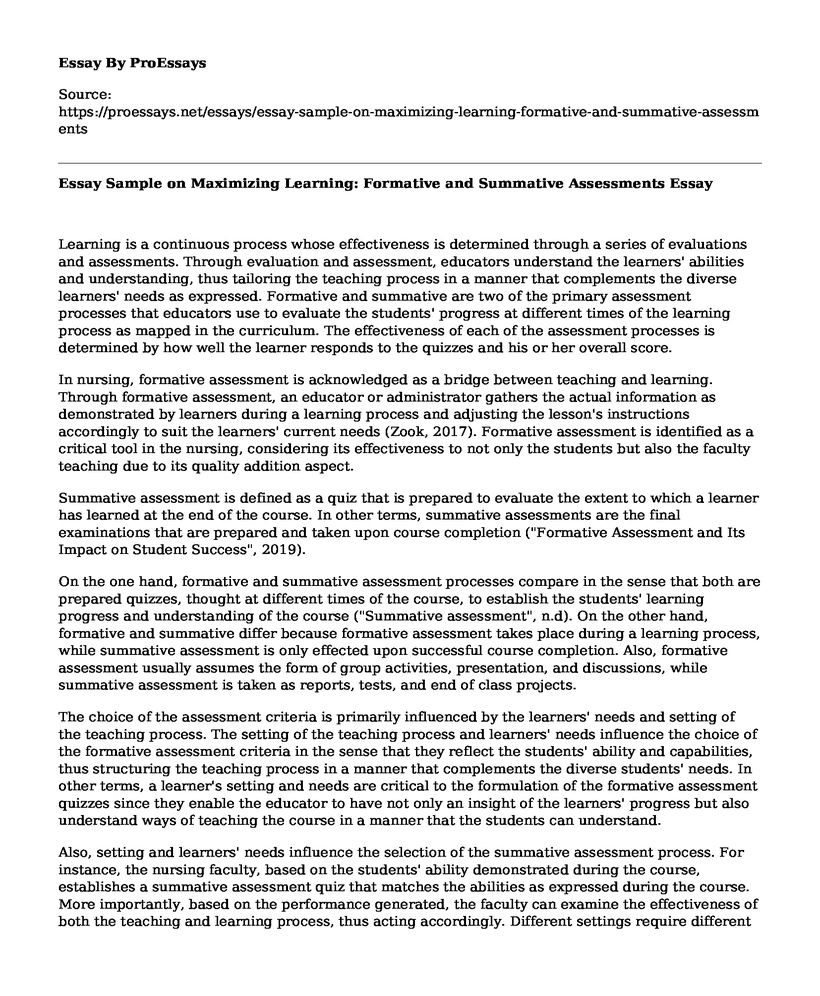Learning is a continuous process whose effectiveness is determined through a series of evaluations and assessments. Through evaluation and assessment, educators understand the learners' abilities and understanding, thus tailoring the teaching process in a manner that complements the diverse learners' needs as expressed. Formative and summative are two of the primary assessment processes that educators use to evaluate the students' progress at different times of the learning process as mapped in the curriculum. The effectiveness of each of the assessment processes is determined by how well the learner responds to the quizzes and his or her overall score.
In nursing, formative assessment is acknowledged as a bridge between teaching and learning. Through formative assessment, an educator or administrator gathers the actual information as demonstrated by learners during a learning process and adjusting the lesson's instructions accordingly to suit the learners' current needs (Zook, 2017). Formative assessment is identified as a critical tool in the nursing, considering its effectiveness to not only the students but also the faculty teaching due to its quality addition aspect.
Summative assessment is defined as a quiz that is prepared to evaluate the extent to which a learner has learned at the end of the course. In other terms, summative assessments are the final examinations that are prepared and taken upon course completion ("Formative Assessment and Its Impact on Student Success", 2019).
On the one hand, formative and summative assessment processes compare in the sense that both are prepared quizzes, thought at different times of the course, to establish the students' learning progress and understanding of the course ("Summative assessment", n.d). On the other hand, formative and summative differ because formative assessment takes place during a learning process, while summative assessment is only effected upon successful course completion. Also, formative assessment usually assumes the form of group activities, presentation, and discussions, while summative assessment is taken as reports, tests, and end of class projects.
The choice of the assessment criteria is primarily influenced by the learners' needs and setting of the teaching process. The setting of the teaching process and learners' needs influence the choice of the formative assessment criteria in the sense that they reflect the students' ability and capabilities, thus structuring the teaching process in a manner that complements the diverse students' needs. In other terms, a learner's setting and needs are critical to the formulation of the formative assessment quizzes since they enable the educator to have not only an insight of the learners' progress but also understand ways of teaching the course in a manner that the students can understand.
Also, setting and learners' needs influence the selection of the summative assessment process. For instance, the nursing faculty, based on the students' ability demonstrated during the course, establishes a summative assessment quiz that matches the abilities as expressed during the course. More importantly, based on the performance generated, the faculty can examine the effectiveness of both the teaching and learning process, thus acting accordingly. Different settings require different assessment tools and processes. For instance, a diagnostic process requires a formative assessment tool and process since a nursing administrator needs to understand the patient's needs while offering the right form of care during the treatment process (Lippincott, 2017). An evaluation setting requires a summative tool and process chiefly because it happens at the end of the treatment process, and it gives the administrator insight into the quality of treatment offered and the quality of services at the facility.
References
Formative Assessment and Its Impact on Student Success. (2019). Retrieved 4 February 2020, from https://www.nursingcenter.com/journalarticle?Article_ID=4853202&Journal_ID=54026&Issue_ID=4853160
Lippincott. (2017). How Formative Assessment Helps Nursing Students Succeed in the Classroom. Retrieved 4 February 2020, from http://nursingeducation.lww.com/blog.entry.html/2017/02/25/how_formative_assess-X2Ow.html
Summative Assessment. (2017). Retrieved 4 February 2020, from http://blogs.brighton.ac.uk/nurse/assessment-and-feedback/summative-assessment/
Zook, C. (2017). Formative vs. Summative Assessments: What's the Difference?. Retrieved 4 February 2020, from https://www.aeseducation.com/blog/formative-vs.-summative-assessments-what-do-they-mean
Cite this page
Essay Sample on Maximizing Learning: Formative and Summative Assessments. (2023, Mar 27). Retrieved from https://proessays.net/essays/essay-sample-on-maximizing-learning-formative-and-summative-assessments
If you are the original author of this essay and no longer wish to have it published on the ProEssays website, please click below to request its removal:
- High School Should Start Later - Argumentative Essay
- Single-Family Students Essay Example
- Annotated Bibliography: School Uniforms and Human Rights/Freedom of Speech
- Essay Example on UNLV UULOs: A Guide to Successful Undergraduate Learning
- School Property Tax Debate Reaches PA: Argall's Tax Shift Plan Criticized - Essay Sample
- Essay Example on Stonier: Setting the Pace in Executive Education since 1935
- Paper on The Phonemes /b/ and /p/







